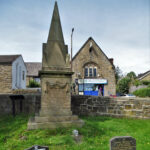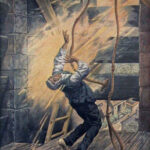23 January 1865: Leeds gentleman-photographer, William Lyndon Smith, drowns while trying to save an ice-skating couple on Benyon’s Pond at Gledhow Hall, Leeds
Leeds Mercury. 1865/01/24. Melancholy ice accident near Leeds. A gentleman and lady drowned. Leeds. Get it:
.Unedited excerpt
If an excerpt is used in the book, it will be shorter, edited and, where applicable, translated.
A deplorable accident, attended with fatal results, occurred yesterday afternoon a short distance from Leeds. The keen frost of the last few days having frozen over the streams and ponds, the lovers of the exhilarating amusement of skating were not unwilling to avail themselves of the opportunity of enjoying this active means of recreation. For some years one of the most favourite resorts of the lovers of skating has been Benyon’s Pond, within the grounds of Gledhow Hall, about three miles from Leeds. It is an artificial lake, about 200 yards long, varying in breadth from forty to fifty yards; and although situated in a private park it was, during Mr. [Thomas] Benyon’s occupancy of Gledhow Hall, always available as a skating ground, and when the opportunity offered, since Mr. [John] Cooper became the owner of the property, the public have also been allowed to use it for a similar purpose. Yesterday afternoon there were about 100 persons, most of them belonging to the upper and middle class, skating on the pond. Amongst them was Miss [Mary Jane] Bulmer, daughter of Mr. [George] Bulmer, surgeon, Park Square, a young lady sixteen years of age, who had accompanied Mr. Samuel Haigh, her father’s assistant, and Mr. Broughton, a medical student, and, we believe, brother of Mr. Broughton, professor of music. Shortly before five o’clock, when the recreations of the day were approaching their termination, Miss Bulmer, seated in a chair, was being pushed along the ice by Mr. Broughton. No indications of weakness in the ice had exhibited themselves, but as the chair reached the end of the pond nearest Leeds, where it is stated a spring or drain exists, and where, therefore, it would naturally be weakest, there was a crack, the fragile support suddenly disappeared, and Miss Bulmer and Mr. Broughton sank beneath the surface of the water. Instantly an alarm was raised, and several of the skaters hurried to the spot. Foremost amongat them was Mr. Lyndon Smith, who, in his gallant efforts to save the lives of others, sacrificed his own. He fell into the water, the depth of which unhappily was so great that he was unable to extricate himself. Others fell into or entered the water in the hope of rendering assistance, and one of them, a gentleman named Jackson, by the aid of a stick, succeeded in rescuing Mr. Broughton, but, unfortunately, neither Miss Bulmer nor Mr. Smith could be reached. Information was immediately sent to the police station, and Sergt. Handley, accompanied by Mr. Carter, surgeon, and three constables, as soon as possible arrived at the place, and endeavoured to recover the bodies. To accomplish this they had to dig out the boat from the ice in which it was embedded, transport it to the side of the pond nearest the spot where the melancholy accident had occurred, and then to break the ice until it reached the place where it had given way. This having been done, the body of Miss Bulmer was first recovered, and in a few minutes afterwards that of Mr. Smith. Mr. Hey, surgeon, who resides near, in the meantime had arrived, but as the bodies had then been in the water for nearly two hours, it is needless to say that any attempt to restore life would have been altogether fruitless. The body of Miss Bulmer was removed to the Mexbro’ Arms, Chapeltown, and that of Mr. Smith to the residence of his grandfather, Mr. William Smith, a gentleman known throughout the country by his noble contributions to the Wesleyan Missionary and other charitable objects. Mr. Lyndon Smith, who was a partner in the firm of William Smith, Son, and Co., woollen merchants, Cookridge Street, Leeds, also occupied a distinguished position as an amateur photographist. He was about thirty years of age, and leaves a widow and three children. Information of the melancholy event was communicated to Mr. Blackburn, the borough coroner, who will probably open the inquest this day.
Comment
Comment
The V&A has a collection of Smith’s images.
Neville Hurworth:
There were a few letters to the Leeds Mercury that the condition of the ice was unfit for skating at the time. One even said that the ice rocked ‘like a carpet with a draught’ and referred to a gentleman who was ‘very active with a chair’ and who had ‘a large brown beer jug over his shoulder, with which he regaled himself and his friends’ but this was not substantiated during the inquest.
The Coroner said that since Mr Cooper was kind enough to allow his pond to be used he could hardly be called upon to provide apparatus for saving life. A verdict of ‘accidental death’ was returned.
There were several letters written to the Leeds Mercury saying how similar accidents could be avoided in the future. An article in the Leeds Mercury concluded with the suggestion that if skating clubs were formed with members paying ‘a comparatively small subscription’, a safety service could be funded so that iced-over ponds with deep water could be guarded and equipped with whatever was necessary to maintain the safety of the skaters in future.
Less than a week after the accident, John Cooper wrote to the Leeds Mercury. He was mortified and sorry that two lives had been lost on his estate. He said that on several occasions his servants had warned that the ice was not safe to skate on but ‘the admonition was disregarded.’ He was withdrawing access to the public for the rest of the winter and whether the amenity would be allowed in the future would depend on what arrangements could be put in place to secure the skaters safety (Hurworth 2009).
Something to say? Get in touch
Similar
 1 January 1891: Eleven snowflake girls are burnt to death during a school entertainment at Upper Wortley (Leeds)
1 January 1891: Eleven snowflake girls are burnt to death during a school entertainment at Upper Wortley (Leeds) 4 July 1838: 26 girls and boys drown trying to escape via a tunnel from flash flooding in Huskar Colliery, Silkstone, Barnsley, after the steam lifts fail during a rainstorm
4 July 1838: 26 girls and boys drown trying to escape via a tunnel from flash flooding in Huskar Colliery, Silkstone, Barnsley, after the steam lifts fail during a rainstorm 17 November 1812: A doggerel inscription at St. George’s, Doncaster, commemorates two sons of ringing master Robert Smith, one of whom died by his father’s bells
17 November 1812: A doggerel inscription at St. George’s, Doncaster, commemorates two sons of ringing master Robert Smith, one of whom died by his father’s bells 20 March 1848: Showman Pablo Fanque tells an inquest how he overfilled a poorly propped Leeds circus, which collapsed, killing his wife
20 March 1848: Showman Pablo Fanque tells an inquest how he overfilled a poorly propped Leeds circus, which collapsed, killing his wife
Comment
Comment
Water Lane used to extend from Bridge Road in Holbeck past the Victoria Bridge to Leeds Bridge, but much of the eastern part is now submerged under the dismal Asda House.
Something to say? Get in touch
Search
Donate
Music & books
Place-People-Play: Childcare (and the Kazookestra) on the Headingley/Weetwood borders next to Meanwood Park.
Music from and about Yorkshire by Leeds's Singing Organ-Grinder.


 Bluesky
Bluesky Extwitter
Extwitter